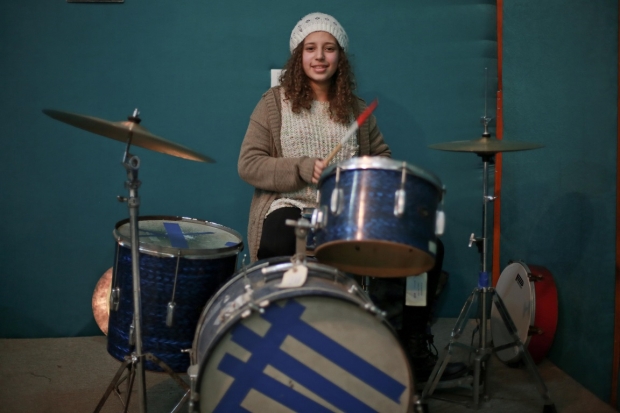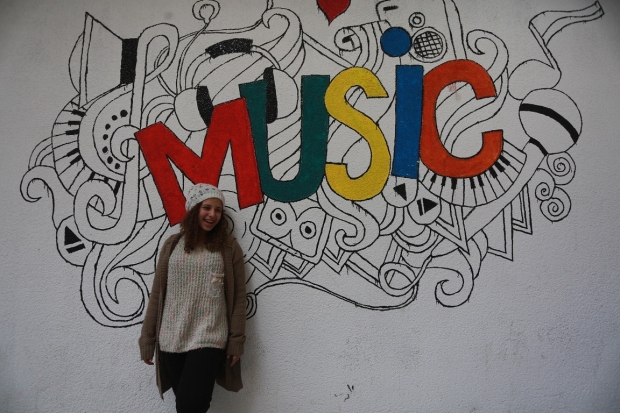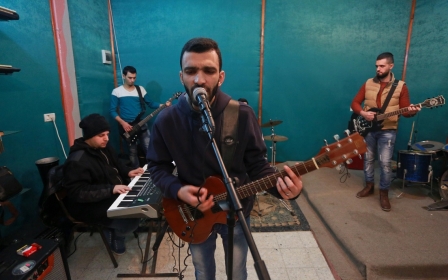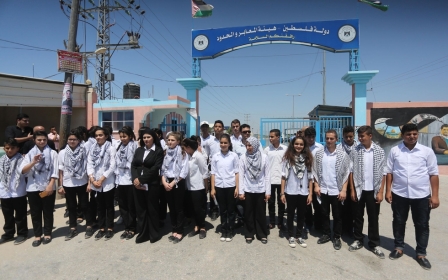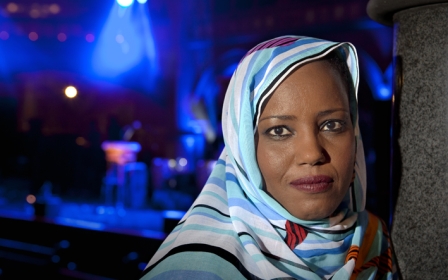Gaza's first girl drummer: 'I will never give up on my dream'
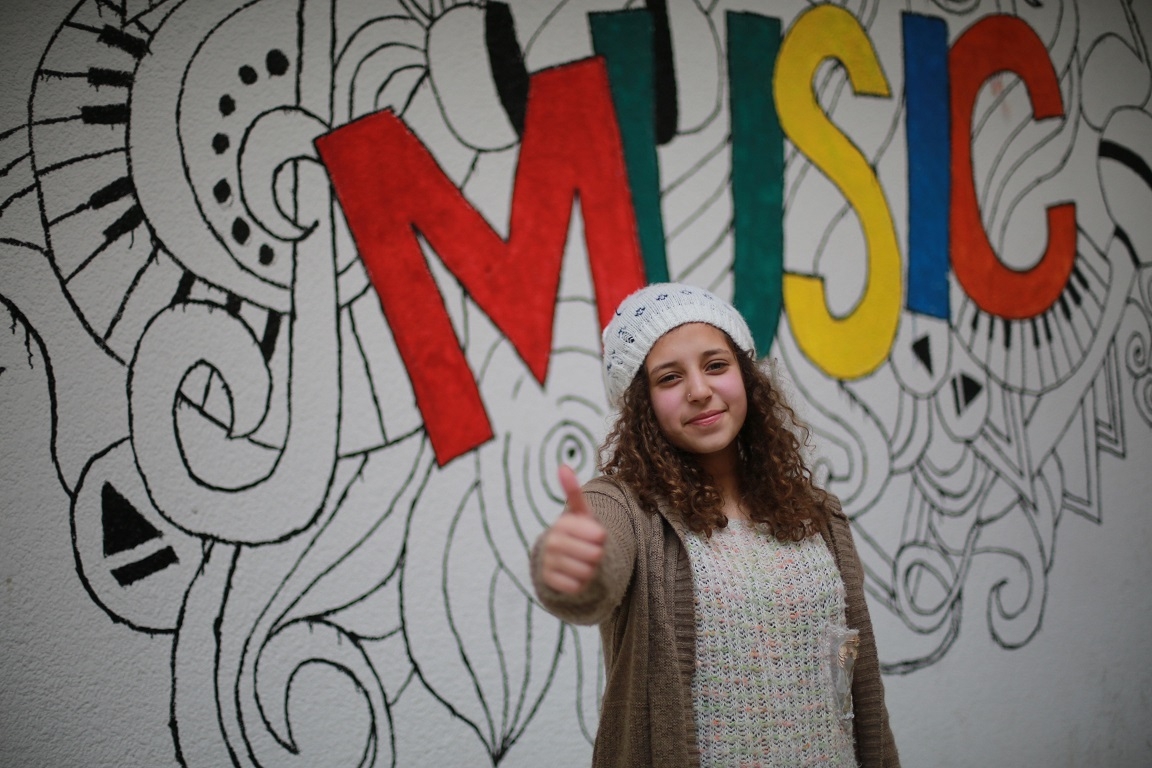
GAZA STRIP - There is no doubt that the young woman believes in her talent. As she confidently heads into the drum room at Sayed Darwish music school in Gaza, Nana Ashour, Gaza's first girl drummer, brushes her curls away from her eyes. Before her drumsticks strike their first beat with the help of her teacher, the 16-year-old politely greets everyone around her.
"Playing drums in a concert is a dream for me," Ashour said. "I keep imagining the moment when I will stand on stage and see people's reaction as they watch a girl playing drums."
Ashour is preparing for her first concert being held at Al-Mishal cultural centre in Gaza city. The event being organised by her music school will also highlight the musical talents of the local "Sol band," of which her teacher, Fares Anbar, 22, is also a member.
Ashour is due to graduate from high school next year and dreams of having more opportunities to perform in front of an audience that respect and appreciate her talent. Playing drums in a conservative community has not always been easy for her. Though she has had much support, Ashour has also faced a lot of criticism.
'I keep imagining the moment when I will stand on stage and see people's reaction as they watch a girl playing drums'
- Nana Ashour, Gaza's first female drummer
One of these challenges has been from within her own circle of friends that accused her of disrespecting culture and traditions.
“Some of them don't talk with me anymore,” she said.
Negative criticism has also been from peers and their parents alike, with some saying that they did not believe it was even happening in Gaza. "Is this in Gaza? This girl should be [studying] at school,” one complained. Others said girls learning music was haram (forbidden) in Islam. "This is not acceptable in Islam," while another said: "Why is she playing music? She doesn't wear hijab!"
To some, the sole fact that they have been living under Israeli siege since 2007 means that any joy should be avoided. "We live in woes, while these kids play music and dance?" according to one.
Yet fortunately, Ashour’s parents and family have been very supportive and have encouraged her to pursue her talent. The oldest of four sisters, she is aware of how open-minded her family is. Her mother, a journalist, is particularly encouraging.
'It's unusual for parents in Gaza to allow their daughter to learn how to play the drums, or go alone to a music school'
- Nana Ashour
"I'm very lucky to be surrounded by people who believe in my talent,” she said. "It's unusual for parents in Gaza to allow their daughter to learn how to play the drums, or go alone to a music school, but my parents trust me and I appreciate their unique way of bringing me up."
Anbar explained that even parents who are willing to allow their daughters to learn and practise music often refuse any form of publication of videos or photos, and do not permit their daughters to play in concerts.
"Some parents know that their daughters are talented, but they prefer not to face society,” Anbar said. “This affects the girls and discourages them because they feel that their talent is a taboo or an unacceptable act.”
The director of Gaza's Edward Said National Conservatory of Music (ESNCM), 70-year-old Ibrahim al-Najjar, pointed out that girls in Gaza usually prefer to play instruments such as the piano, guitar or violin. To Najjar, Ashour was unique for taking on the drums.
How it all started
Before returning to Gaza in 2015, the Ashour family lived in Egypt for five years. During that period, Nana was able to improve her musical skills while at the same time participating in school concerts and charity activities there.
'This is not acceptable in Islam'... 'Why is she playing music? She doesn't wear hijab!'
Comments of parents in Gaza
"When I was nine years old, I went to Egypt with my family. While we were walking in al-Hussein, an ancient neighbourhood full of musical instruments and antique shops, I held a tabla, an oriental drum, and started playing on it,” she told MEE. “The shop owner liked my performance and gave me a small tabla as a gift. It was my first musical instrument," she said.
Unlike Gaza, in Egypt Ashour had many friends who played musical instruments as well as encouraged her to develop her talent. But she was still the only girl in the school band who played the tabla.
A special talent despite challenges
Due to the high cost of drumming equipment, Ashour does not have a set of drums currently in her home. Additionally, the noise pollution is sometimes an issue for neighbours. Yet this has not stopped her from practising at home, as her creativity has brought innovation to her drum playing.
The actual drums have taken the form of alternative household tools such as plastic or steel pots and pans, and big wooden spoons make for her favourite homemade drumsticks.
“Although it looks and sounds funny, I enjoy practising very much and I can feel myself improving,” Ashour said.
The quality of the musical instruments is another difficulty facing musicians in the Gaza Strip, as they are hard to come by. There is only one drum kit at Sayed Darwish school, which is "old and its quality is poor," according to Anbar; but for now they must make do with what they have.
The exception to this rule is whenever videos need to be recorded, and borrowing a better drum kit from other Gaza drummers is their best option.
'I will do my best to make her proud and inspire other girls who have dreams but feel like they can't achieve them'
- AshourIbrahim al-Najjar, Director of ESNCM
Anbar can sympathise with Ashour as he was also a child when he started playing the drums at the age of six.
“I was amazed by her will to learn. I've been teaching drums for two years, but this was the first time I meet a girl with such talent," Anbar said.
“I don't feel like I'm playing with a student. She is a good player with a promising future awaiting her," he added.
Back in February, a one-minute video of Anbar and Ashour playing drums went viral on Facebook and social media. The response was so positive that more than fifteen girls signed up for classes at Sayed Darwish school, with four of them choosing to learn drums.
"In our first video, we focused on oriental beats and rhythms because they are easier for Nana, as a beginner, and more familiar to the ordinary Gazan listener," Anbar said.
A new generation of Palestinian musicians
According to Najjar, girls' love for music is a "natural emotional instinct".
"I've been working in this field for 46 years. According to my experience, girls tend to learn music more than boys. At our Gaza branch, we have 180 students, [and] 120 of them are girls aged between 12 and 17," he said.
ESNCM is a non-profit institution that has branches in Jerusalem, Ramallah, Bethlehem, Nablus, and Gaza. Students only pay a small yearly fee, so the conservatory depends on projects funded by local and international donors.
'In a few years, the current students will graduate and they will make a real musical revolution in the Gazan society'
- Ibrahim al-Najjar, director of ESNCM
Every year, ESNCM organises music festivals that give local musicians and bands the opportunity to play on stages all over Gaza and the West Bank.
For Najjar, musical institutions have planted a seed in Palestinian society by teaching music to dozens of children.
“In a few years, the current students will graduate and they will make a real musical revolution in Gazan society,” Najjar said.
He is not shy about boasting about how qualified Gaza's musicians are, or how far they will go.
"We are talking about professional and highly qualified musicians who will represent Palestine and Gaza in local and international events. Those young musicians, especially the girls, will affect others, directly or indirectly, causing a special musical phenomenon," Najjar added.
Gaza is 'full of danger'
Nowadays Ashour and Anbar are getting ready for their second video which will include advanced techniques and western beats.
Ashour does not hesitate to sing the praises of her journalist mother, who is her role model. “I will do my best to make her proud and inspire other girls who have dreams but feel like they can't achieve them,” she says.
Middle East Eye propose une couverture et une analyse indépendantes et incomparables du Moyen-Orient, de l’Afrique du Nord et d’autres régions du monde. Pour en savoir plus sur la reprise de ce contenu et les frais qui s’appliquent, veuillez remplir ce formulaire [en anglais]. Pour en savoir plus sur MEE, cliquez ici [en anglais].


